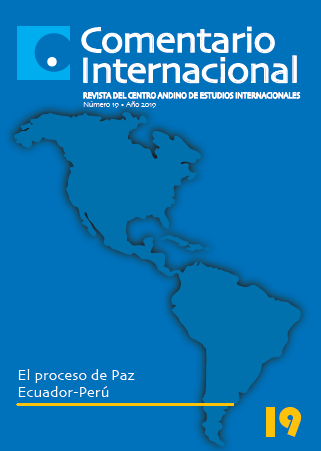La ampliación de la periferia en el cambio de centro hegemónico
DOI:
https://doi.org/10.32719/26312549.2019.19.5Keywords:
United States, China, capitalism, center-periphery, underdevelopmentAbstract
This paper aims to build a theoretical model to analyze, from a historical perspective, the current transmission of the United States hegemony to China and its effects on Latin America. The model of analysis constructed shows that, historically, the end of the supremacy of a hegemonic center is produced by a systemic crisis of over-accumulation of capital that requires capitalism to expand. Thus, the historical constant has been that the capitalist system overcomes its crisis by expanding with a cycle of overexploitation of labor and raw materials that industrializes the emerging economies and decapitalizes the peripheries, making emerging centers such as China candidates to become a hegemonic center, while peripheries such as Latin America deepen and perpetuate their condition of underdevelopment.
Downloads
References
Arrighi, Giovanni. Adam Smith en Pekín, Orígenes y fundamentos del siglo XXI. Traducido por Juanmari Madariaga. Madrid: Akal, 2007.
Bambirra, Vania. El capitalismo dependiente latinoamericano. Madrid: Siglo XXI, 1999.
Banco Mundial.“Banco Mundial, estadísticas”. 13 de septiembre de 2017. ‹https://bit.ly/30WCWrb›.
Brenner, Robert. Turbulencias en la economía mundial. Santiago: Lom, 1999.
Bruckmann, Mónica. Recursos Naturales y la Geopolítica de la Integración Sudamericana. Quito: Instituto de Altos Estudios Nacionales, 2012.
Brzezinski, Zbigniew. El gran tablero mundial: la supremacía estadounidense y sus imperativos geoestratégicos. Buenos Aires: PAIDOS, 1998.
Brzezinski, Zbigniew. “An Agenda for NATO”. Foreign Affairs. Septiembre / Octubre (2009). ‹https://fam.ag/37xcKpl›.
Bunker, Stephen. Underdeveloping the Amazon. United States of America: The University of Chicago Press, 1985.
Dos Santos, Theotonio. Imperialismo y dependencia. México: Editorial Era, 1978.
Espinoza Piguave, Edwin Ulises. “La relación económica entre el Ecuador y China, 2002-2013”. Tesis de Maestría, Facultad Latinoamericana de Ciencias Sociales Sede Ecuador, 2015.
Frank, André Gunder. Capitalismo y Subdesarrollo en América Latina. México: Siglo XXI editores, 1976.
Furtado, Celso. Los Estados Unidos y el subdesarrollo de América Latina. Lima: IEP / Campodónico ediciones S.A, 1971.
Harvey, David. Los límites del capital y la teoría marxista. Traducido por Mariluz Caso. Ciudad de México: Fondo de Cultura Económica, 1990.
______. Espacios del capital: Hacia una geografía crítica. Madrid: Akal, 2001.
______. El ‘nuevo’ imperialismo: acumulación por desposesión. Buenos Aires: CLACSO, 2005. ‹https://bit.ly/2SqOChN›.
Klauer, Alfonso. ¿Leyes de la historia? 1 vol. Lima: El Cid, 2003.
Luxemburgo, Rosa. The Accumulation of Capital. Traducido por Agnes Schwarzschild. Nueva York: Routledge Classics, 1968.
Martínez Alier, Joan . De la Economía Ecológica al Ecologismo Popular. Barcelona: ICARIA, 1994.
Marx, Karl. El Capital. 1 vol. Moscú: Foreign Languages Publishing House, 1959.
Merino, Gabriel. “Tensiones mundiales, multipolaridad relativa y bloques de poder en una nueva fase de la crisis del orden mundial. Perspectivas para América Latina”. Geopolítica (s). Revista de estudios sobre espacio y poder 7, n.° 2 (2016): 201-25. doi: 10.5209/GEOP.51951
Morales Ruvalcaba, Daniel; Alberto Rocha Valencia y Elizabeth Vargas García. “Las potencias regionales como protagonistas del sistema político internacional: cooperación y diálogo en el Foro BRICS”. Geopolítica (s). Revista de estudios sobre espacio y poder 4, n.° 2 (2014): 237-61. doi: ‹10.5209/rev_GEOP.2013.v4.n2.42582›
Narodowski, Patricio y Gabriel Merino. “La agudización de las tensiones globales. Análisis de la crisis del orden unipolar y los conflictos geoestratégicos desde una perspectiva centro-periferia”. Estudios Socioterritoriales, n.° 18 (2015): 81-99. ‹https://bit.ly/2v9YZPk›.
Prebisch, Raul. “Growth, Disequilibrium and Disparities: Interpretation of the Process of Economic Development”. Economic Survey of Latin America, (1949): 3-85. ‹https://bit.ly/2Uy0FN5›.
Rocha Valencia, Alberto y Daniel Efrén Morales Ruvalcaba. “Potencias medias y potencias regionales en el sistema político internacional de Guerra Fría y Posguerra Fría. Propuesta de dos modelos teóricos”. Geopolítica (s). Revista de estudios sobre espacio y poder 1, n.° 2 (2011): 251-79. ‹https://bit.ly/2Uy14iz›.
Singer, Hans. “U.S. Foreign Investment in Underdeveloped Areas, the Distribution of Gains between Investing and Borrowing Countries”. The American Economic Review 40, n.° 2 (1950): 473-85.
Smith, Adam. Investigación de la naturaleza y causas de la riqueza de las naciones. 2 vol. Traducido por Josef Alonso Ortiz. Valladolid: Oficina de la Viuda e hijos de Santander, 1974.
Wallerstein, Immanuel. “¿Globalización o era de transición?”. Universidad Autónoma de México, 2002. ‹https://bit.ly/2Th85SC›.
Downloads
Published
How to Cite
Issue
Section
License
Authors who publish in this journal accept the following conditions:
1. The authors keep the copyright and assign to the journal Comentario Internacional the right of the first publication, with the work registered with the attribution license of Creative Commons, which allows third parties to use what is published whenever they mention the authorship of the work and the first publication in this journal.
2. Authors can make other independent and additional contractual arrangements for the non-exclusive distribution of the article published in this journal (eg, include it in an institutional repository or publish it in a book) provided they clearly indicate that the work was published for the first time in Comentario Internacional.







